Indigenous knowledge, often referred to as IK, encompasses a wealth of local wisdom held by indigenous communities. This knowledge spans customs, traditions, traditional ecological knowledge (TEK), history, religious beliefs, cosmology, traditional languages, skills, concepts, and practices. Indigenous knowledge is of paramount importance for promoting sustainability, as it is deeply rooted in the relationship between communities and their environment. Passed down through generations, traditional ecological knowledge provides invaluable insights into cultural survival and resilience, especially in the face of climate change. This knowledge guides the long-term utilization and management of natural resources, contributing to environmental preservation and community resilience. Recognizing and sharing indigenous knowledge is crucial for addressing 21st-century sustainability challenges, promoting conservation, and enhancing the quality of life for all. Moreover, it plays a vital role in global debates on pressing issues, making it an essential component of education for a sustainable future.
Nagaland, the homeland of the Nagas, is a hilly region surrounded by lush forests and is renowned as one of the world’s most diverse biodiversity hotspots. For the Nagas and other tribal communities, their connection with the forest is a fundamental aspect of their lives, influencing their social and economic well-being. They view the forest as the source of livelihood, providing food, medicine, fuel, timber, raw materials for crafts, pasture for cattle, and shelter. Agriculture is the primary occupation in Nagaland, with forest-related activities also playing a significant role in the local economy. Other livelihoods include teaching, nursing, government employment, and religious service. Even households engaged in non-agricultural activities often practice agriculture as a secondary source of income.
Sustainable Practices in Naga Traditions
The Nagas have adopted a variety of sustainable agricultural practices that have been passed down through generations. These practices not only enhance crop yields but also promote ecological balance.
Use of Organic Fertilizers:
The Naga agricultural approach is primarily organic, avoiding chemical fertilizers. They utilize organic materials such as poultry bird excreta and wood ashes to enrich the soil. Bird excreta, when turned into powder, enhances plant germination, and wood ashes, rich in potassium and minerals, increase soil fertility.
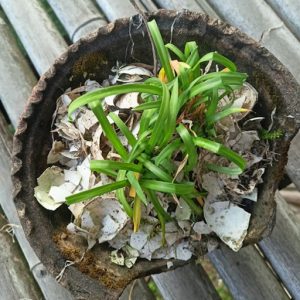
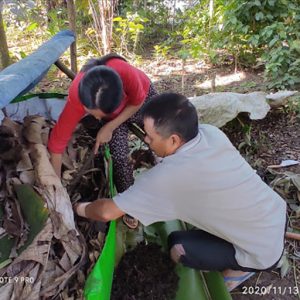
Eggshell Fertilizer:
Crushed eggshells are used as a natural fertilizer, providing essential minerals like calcium carbonate, potassium, phosphorus, and magnesium for plant growth.
Vermicomposting:
Some Naga households practice vermicomposting, a simple method of converting agricultural waste into nutrient-rich compost. Earthworms digest biomass, producing “black gold” castings that enhance soil fertility and reduce harmful bacteria.
Seed Preservation:
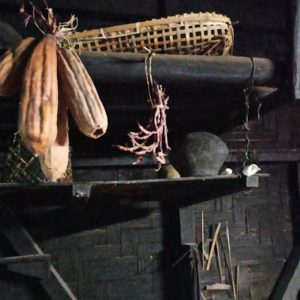
The Naga people have a tradition of preserving and conserving their own seeds. This practice maintains genetic diversity and resilience within their agricultural systems, ensuring local varieties suited to the environment are preserved for future planting.
Tree Planting:
Some Naga households practice vermicomposting, a simple method of converting agricultural waste into nutrient-rich compost. Earthworms digest biomass, producing “black gold” castings that enhance soil fertility and reduce harmful bacteria.
Traditional/Religious Beliefs:
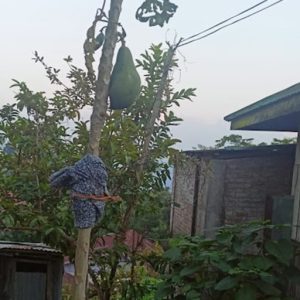
Naga traditions and religious beliefs are integrated into sustainable farming. It is stated that staminate (male) plants do not produce fruits/flowers, hence Naga people wrap mekhela around the trees to allow them to stimulate fruit production. First fruits are offered to God for blessings. They also refrain from harvesting the last fruits to ensure bountiful yields in the next season.
Traditional Crafts:
The Nagas promote eco-friendly practices in their daily lives. They use biodegradable plates made from bamboo or banana leaves, which are reusable. Food is served on bamboo, reducing waste and avoiding the use of non-biodegradable plastic plates. Bamboo and wooden cutlery are preferred to minimize plastic pollution.
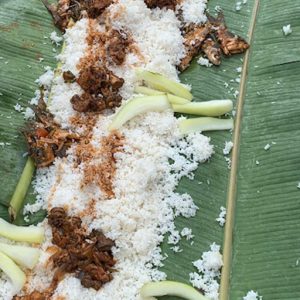

The traditional sustainable practices in horticulture and crafts among the Naga people exemplify the importance of indigenous knowledge in promoting long-term sustainability. It is not only beneficial for the community but also serve as a valuable example of how traditional wisdom can contribute to a sustainable future. By nurturing a deep connection with their environment and embracing practices that promote ecological balance, the Nagas exemplify the potential of indigenous knowledge in addressing contemporary sustainability challenges. It is crucial to recognize, document, and promote these practices to ensure the preservation of indigenous knowledge and enhance global sustainability efforts. Future research should focus on further understanding and disseminating these practices, and efforts should be made to promote their adoption among indigenous communities worldwide.
Ajungla
BA 5th Semester, Sociology Honors
Tetso College
